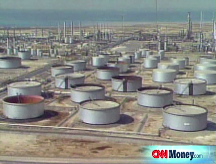Gas prices rise as Ike hits Texas
The average price of gas surged nearly 6 cents nationwide as Hurricane Ike hits Gulf Coast and analysts fear more increases, especially in Texas.
NEW YORK (CNNMoney.com) -- Gas prices rose for the fourth straight day as Hurricane Ike slammed the Texas Gulf Coast early Saturday morning.
According to a nationwide survey released by the motorist group AAA Saturday, the average price of regular unleaded gasoline edged up 5.8 cents to $3.73 a gallon, from $3.675 a day earlier.
AAA said the nearly 6 cent increase was the biggest one-day spike this year and the largest since shortly after Hurricane Katrina hit the Gulf Coast in 2005. The price of gas rose by 14 cents and 16 cents on consecutive days in the aftermath of Katrina.
The national price increase was driven by sharp spikes in the Southeast, primarily the Carolinas, Tennessee and Kentucky, states which lie at the end of several Gulf pipelines. Generally, increases in other regions were fairly slight.
In Texas, where the storm made landfall early Saturday, the average price rose 5.4 cents to $3.60 a gallon.
In the two coastal areas affected most directly by the storm, Galveston and Houston, prices rose 3.6 cents and 4.8 cents to $3.525 and $3.544 respectively.
Analysts have expressed fears that gas prices could continue to rise in the next few days as as Hurricane Ike's approach to the Texas Gulf Coast led to shutdown of oil drilling and refining in the region.
But the Department of Energy and other agencies will make sure consumers don't get hurt by efforts to raise gas prices the wake of Hurricane Ike, President Bush said Saturday.
Shortages are predicted because of the large number of refineries shut down on the Gulf Coast ahead of the storm. In a brief televised statement, Bush said the Environmental Protection Agency waivers on certain reformulated gasolines were suspended Friday night to make it easier for imports to get into U.S. markets.
In Texas, iReporters told CNN.com that they were facing long lines to buy gas. Cheri Morgan said Friday that she waited for a half hour to fill up her car in Houston before evacuating to San Antonio.
"Everyone was driving crazy and they really need some kind of traffic flow at the gas stations. It's wild," she said. "Everybody's rushing and panicking."
And iReporter Kyle Norton said Friday he waited for an hour at a Sam's Club in College Station, Texas to get gas as people were filling up their cars and gas cans. He added that a friend went to four gas stations before finding one that still had regular unleaded gasoline.
Speaking on Friday, AAA spokesman Dan Ronan, who is based in Irving near Dallas, said that Houston-based AAA staffers reported 20 cent increases at some gas stations, but they're in the minority. Likewise, he said the reports of stations running low on gas in coastal Texas are scattered and isolated.
"There have been anecdotal reports about service stations running low on fuel and that's to be expected," said Ronan. "The good thing is that it seems as though the state and delivery systems have gotten a lot better since Katrina."
Prices have been rising in the Midwest and Southeast as of late partly due to production delays caused by Hurricane Gustav.
Nationwide, Alaska and Hawaii remained the two states with gas prices still tracking above $4 a gallon; Alaska at $4.365 and Hawaii at $4.321, according to AAA. The cheapest gas continues to be found in New Jersey, where prices averaged $3.424 a gallon.
Gas remains about 9.3%, or 38.1 cents, below the record high average of $4.114 a gallon that AAA reported July 17. Prices are down 4.5 cents down in the past month, but up 93.2 cents from a year ago.
Tom Kloza from Oil Price Information Service, which provides the data for AAA, said Friday the nationwide average for gas prices could break the July 17 record as a result of the hurricane, but even if that happens, they would stabilize by October.
Oil prices rose Friday to $101.18 a barrel on concern about Ike after briefly dipping below $100 a barrel for the first time since April 2.
CNNMoney.com staff writer Aaron Smith, CNN.com and CNN Wires contributed to this report. ![]()



